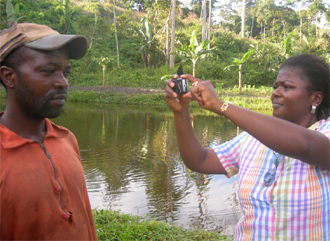Video journalism
Print this study schedule as a book

Video Journalism will assist you to develop a video news story that may have the density for further development, to become a current affairs piece and ultimately a documentary film. This study schedule, therefore, is a production process that an independent video journalist can follow with the view to broadcasting their work through reputable news outlets, or disseminating it through online open source news media channels like Wikinews.
The process here focuses on script writing and the ability to grammatically sequence pictures, firstly in script form, so that meaning is conveyed with clarity and impact. This is also to assist others, like editors working on the story, to understand the intentions of the journalist. This schedule will assist you in developing advanced skills in writing, editing, producing and presenting information for video, and in video. You can follow a sequence of development from the news story, through to a more developed current affairs story, and onto a refined documentary. Everything here is underpinned by relevant theory in video making and camera ethics.
We trust that you will find this study schedule stimulating and relevant to your aspirations and interests. The future of video news, current affairs and documentary, will see freelance and sole operators using portable digital-video technology and the methods extolled in this course.
Best wishes in your study and always enjoy reading moving pictures.
Assignments edit
- Identify a news story - Identify a news story to develop into a current affairs story and onwards to a documentary. Provide a brief synopsis of your intentions and aspirations with this study schedule.
- Produce a news story - Research the news story, develop a first draft script for review by a Chief of Staff Reviewer, refine the script to a paper edit, and produce the video news story.
- Develop a current affairs story - Develop a synopsis and script for the current affairs story, provide rushes of material shot or gathered from archives and libraries and include a treatment for the production
- Script a documentary - Research and develop a treatment and script for a documentary. Provide notes and references verifying research and evidence of re-writes. If possible, show raw video footage to illustrate the developing documentary film.
Objectives edit
- Understand theory and ethics applied to video journalism
- Identify a story with news-worthiness
- Produce a video news script
- Develop a current affairs script and treatment
- Develop a documentary script and treatment
Topics edit
- A Picture's Worth - Introduction, epistemology and the gaze
- The Camera's Eye - Camera, direction and voice
- Constructing Vision - Understand editing and script writing for better shooting
- Telling Stories - Narrative television, everyday, documentary and factual television
- Editing Grammar - What happens to meaning when conveyed in a television story
- Ethics of the Gaze
Resources edit
- Release - This release assists in obtaining informed consent for filmed material like interviews. It will also serve as a release for copyright material, like photographs, music, audio, video and art-works.
- Video News Template - Make your own copy of this template and use it in your news assignments.
- The News Manual - The News Manual is a free online resource for journalists, would-be journalists, educators and people interested in the media. It has developed from the three-volume book 'The News Manual', which was published with the help of UNESCO as a practical guide to people entering the profession and to support mid-career journalists wanting to improve their skills.
- Script Example Delinquent Angel Documentary - This script should be used as a guide to writing your documentary script. Note: the script is about 50 pages, each page represents about 1 minute playing time for the resultant film. The final film is quite different to the script, as in process the editor makes new interpretations, but the script is necessary to provide to everyone involved, including the editor and the funding body. The script therefore at this stage is a legal entity representing the film as envisaged.
- John Perceval: an ethical representation of a delinquent angel - This PhD thesis (pdf) is an depth examination of the filmmaking process and how it might best be approached. The thesis discusses a process of making a documentary film and how that journey was fraught with ethical and legal dilemmas, arriving eventually at the second and broadcast (SBS TV Australia) version of Delinquent Angel. Despite this, the process saw the film receive considerable acclaim, with the film selected for international film festivals and nominated for awards. The Delinquent Angel film therefore became a fine case study to examine the process of filmmaking, which might otherwise be entitled: “Non-fiction Filmmaking: How to Minimize Harm in a Dangerous Profession”. The PhD asserts that if ethical standards are met in filmmaking, or indeed television journalism, it is more likely that costly legal problems will be minimised for the future.
- The Data Journalism Handbook - Leading data journalists from the New York Times, the Guardian, the BBC, and other media organisations from around the world, are working together to answer questions on accurately using data in journalism in the Data Journalism Handbook. The handbook is the first comprehensive practical guide to data journalism.
Research edit
This course is research lead. That is, we conduct research in journalism and online learning, and make changes to this course based on what we find. Below is a list of publications that have influenced the thinking behind this course.